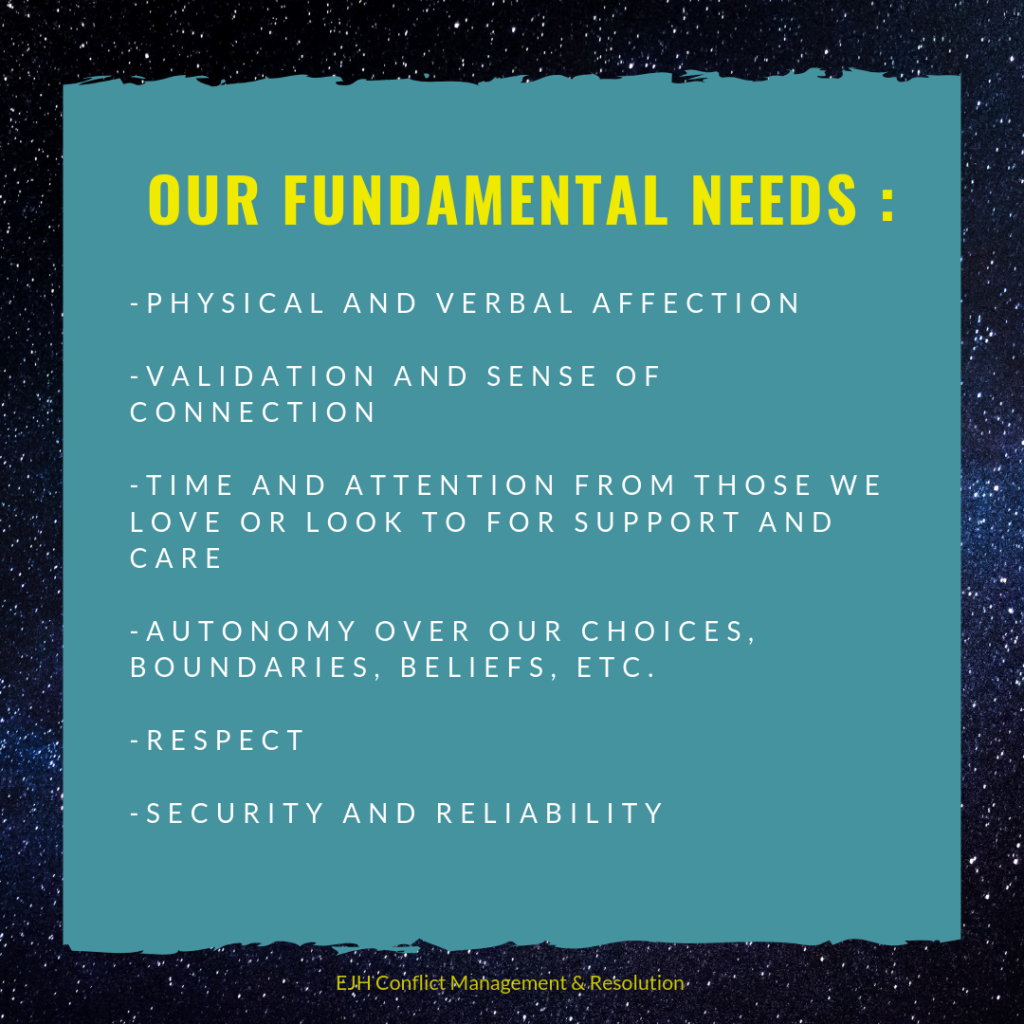At the Root of Most Conflict is a Need Not Being Met

I always say that at the root of most conflicts is a need not being met, and I stick by that. Additionally, it is usually someone not clearly articulating their need by leaving out important information (ex: trying to avoid stating the need by making the situation about ‘something else’); projecting their own assumptions or beliefs (ex: assuming whether or not someone ‘cares’ based on their own judgements and past experiences); having unrealistic expectations (ex: that someone can read their mind) or acting out their desire for that need in ways that are clear only to them (ex: passive aggressive behaviour, withdrawal, etc). But on the flip side of that coin, sometimes there is the person on the receiving end who is doing their part by not listening or by responding in a reactionary manner.
There are usually reasons for why both people are behaving the way they are and often times it is because a basic human need of ours isn’t being met or feels like it is being threatened. All humans have fundamental needs. These needs provide us with feelings of trust, safety, security and empowerment which are critical in navigating through conflict and working our way towards resolution. When our most basic needs are threatened or perceived to be threatened, it becomes harder for people to be vulnerable and harder for us to communicate honestly, intentionally and mindfully with one another.
Physical and verbal affection: all humans need touch and affirmation. From the time we are babies, we rely on human touch to self regulate and we continue to co-regulate as adults. Verbal affection provides validation and reassurance, which supports regulation and self esteem, as well.
Validation and connection : we want to know that we are loved and we want our experiences to be validated. Humans have always been a pack species. Our survival is stronger as a group than alone. Threat of connection can mean threat of our place in the group and therefore a threat to our wellbeing and survival.
Time and attention from those we love or look to for support and care: again, this provides us with feelings of connection and acceptance. When people give us the time and space to share our feelings, experiences, and needs it fosters feelings of being valued and seen, which dominos into feelings of trust and safety. When the people we love and expect care and support from don’t give us time and attention, it leaves us feeling rejected. This can create a lack of trust (among other abandonment issues), where we feel we need to rely solely on ourselves to get what we need because it has been reinforced that others will not do that for us.
Autonomy over our choices, boundaries, beliefs, etc: we need to feel like we have a certain level of control at all times. The moment people sense that their autonomy is being taken away from them is the moment where you will see reactionary behaviour surface, often as the trigger of a survival defence mechanism. Autonomy means our boundaries are respected and dignity intact, which is the opposite of feeling threatened.
Respect: I always say that the moment mutual respect goes out the window, you can say good bye to any de-escalation or resolution. When people’s character, sense of self or dignity becomes threatened, we often see reactionary behaviour.
Security and reliability: all humans need to feel safety in order to feel trust towards a person, place, and even thing. Consistency and reliability support feelings of security by supporting regulation (if it’s something like consistency in housing, for example) or by demonstrating commitment (such as a person’s commitment to listening, advocating, accountability, etc).
Often when I’m assessing an escalation or supporting people through a conflict, I look to see if any of these fundamental needs have been withheld, used in harmful or manipulative ways, or simply ignored due to lack of intentional approach and dialogue. Additionally, if I have a hunch that someone is not fully or truthfully sharing their needs, due to lack of trust of feelings of safety, I assess or explore which fundamental need the person might be feeling is lacking.
When our fundamental needs are being met, we are more likely to respond with honesty and courage (vulnerability). When our fundamental needs are being met, we are more likely to respond intentionally, mindfully and from a place of understanding. Threats of violence, humiliation, minimization, shaming, lying ,etc all are behaviours that threaten those needs and cause individuals to move into states of self protection.


